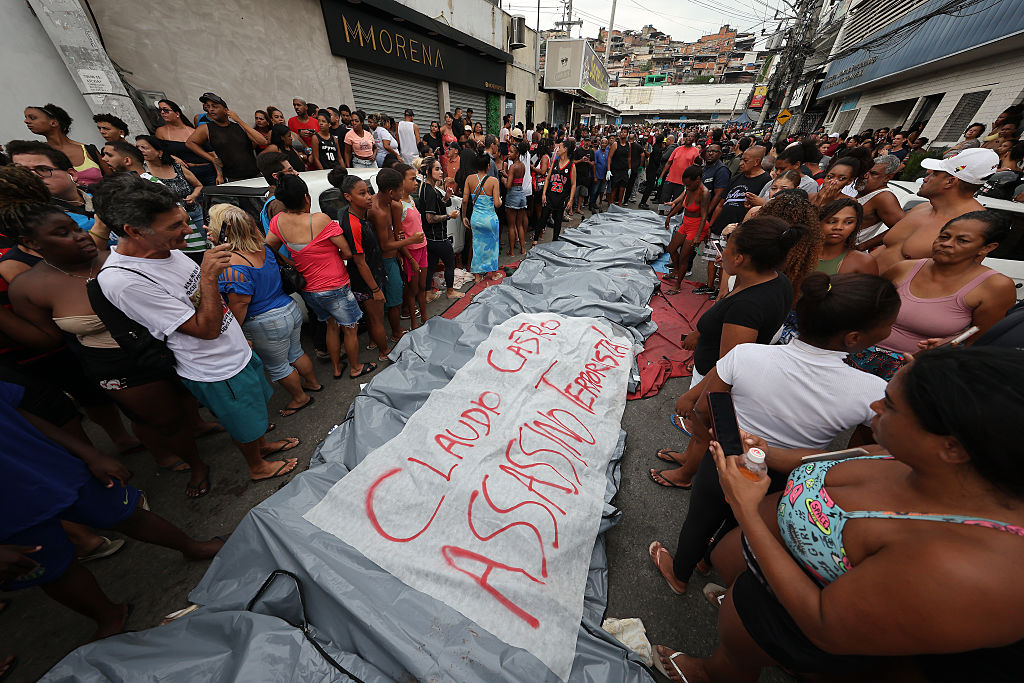At least 40 bodies have been lined up in the streets of Rio de Janeiro the day after a major clash between Brazilian police and the “Red Command” gang that left over 100 people dead, according to officials.
[time-brightcove not-tgx=”true”]
The carnage came after some 2,500 police officers and soldiers launched a massive raid on the drug-trafficking gang in Rio on Tuesday, plunging the city into chaos with shootouts and drone-dropped explosives targeting police during the operation.
By the end of the operation, 81 suspects were arrested and 119 people were dead. It was the Rio police force’s deadliest-ever operation, and drew criticism from rights groups for excessive force.
Claudio Castro, Rio de Janeiro’s governor, shared a video on X in response to the raid, calling it a “historic day in the fight against crime in Rio de Janeiro.”
Read more: A Deadly Police Raid in Rio Shows How Bolsonaro’s Policies Are Wreaking Havoc in Brazil
Meanwhile, human rights groups have called for an investigation into the raid due to the massive death toll.
“The succession of lethal operations that do not result in greater safety for the population, but that in fact cause insecurity, reveals the failure of the policies of Rio de Janeiro,” César Muñoz, director of Human Rights Watch in Brazil, wrote on X, calling the deaths a “tragedy.”
“The public prosecutor’s office must open its own investigations and clarify the circumstances of each death,” he added.
The Rio Times has called the raid the “deadliest day in Rio’s history,” while O Globo said the raid was “the biggest blow that Comando Vermelho [Red Command] has suffered since the beginning of its history.” The death toll surpassed that in a 2021 raid by the police against the group.
Local media reported that suspected gang members blocked roads in northern and southeastern Rio in response, leading to significant damage to buses, while dozens of universities and schools reportedly cancelled classes as the city dealt with the aftermath.
Residents told local news outlets that chaos ensued Tuesday, as they dodged bullets during the raid that leaked into the city streets.
“We saw executed people: shot in the back, shots to the head, stab wounds, people tied up. This level of brutality, the hatred spread—there’s no other way to describe it except as a massacre,” one local activist, Raull Santiago, told ABC.
What is Red Command?
Comando Vermelho, or Red Command, is Brazil’s oldest criminal group, according to InSight Crime, a think tank studying organized crime. The group began in a Rio de Janeiro prison in the 1970s as a means of self-protection for prisoners, and was inspired by leftist guerrillas.
“The terrible conditions in Candido Mendes prison, on Ilha Grande island in the state of Rio de Janeiro, pushed inmates to band together to survive within the system,” the think tank writes in its profile of the group.
In the 1980s, the group became involved in cocaine production and trafficking, but also maintained a social role in the marginalized communities in one of the country’s most visited cities. Its criminal activities include drug trafficking, arms trafficking, protection racketeering, loansharking, and turf wars against other criminal organizations in the area.
The think tank added that the group has had to contend with militia groups trying to elbow their way into territory in recent years, as well as mass police raids, especially since the pandemic. They claim that within the last two years, Red Command has been able to take back control of Rio, now “ruling more than half of the city.”
According to Júlia Quirino, a Ph.D. candidate in Sociology and Anthropology at the Federal University of Rio de Janeiro (UFRJ) who studies Red Command, the group has recently expanded into developing a mobile ride-sharing application.
“More than a curiosity, it is an indication of how illegal armed groups are incorporating digital technologies to expand their capacity for territorial control and revenue diversification,” Quirino’s research found.
According to her research and state public security groups, only 11 percent of the group’s profits come from drug sales, while the majority comes from “extortion of merchants” and providing “essential” services like gas distribution, water sales, and transportation.
Red Command has been gradually extending its control over Rio since 2022, battling with militias who maintain ties to the state and police, to capture territory and cement its hold on the city.
By 2024, power had shifted in Red Command’s favor, according to an InSight Crime report. The group was also extending its control outside of Rio. By the end of 2024, according to the Associated Press, the group controlled half of the municipalities in the Amazon region, up from one-fourth the year before.
Officials said the operation in Rio was aimed at stopping the group’s spread.
The raid signals a new crackdown
Castro’s aggressive tactics against drug trafficking in Rio De Janeiro mirror the right-wing tactics of his former ally, former president Jair Bolsonaro, and could be a move for Castro to score political points on the issue of organized crime.
“We stand firm confronting narcoterrorism,” Castro, from the conservative opposition Liberal Party, said following the raid.
Rio has been particularly plagued by police abuse. The Brazilian Supreme Court ordered Rio in 2020 to work to curb instances of abuse by police officers, a move that Human Rights Watch says has led to a dramatic drop in killings in the state.
The brutality of this week’s raid was enough to draw criticism from the spokesperson for the United Nations High Commissioner for Human Rights (OHCHR), Marta Hurtado.
“We fully understand the challenges of having to deal with violent and well-organized groups such as Red Command,” she said, but she called on Brazil to “break this cycle of extreme brutality and ensure that law enforcement operations comply with international standards regarding the use of force.”

